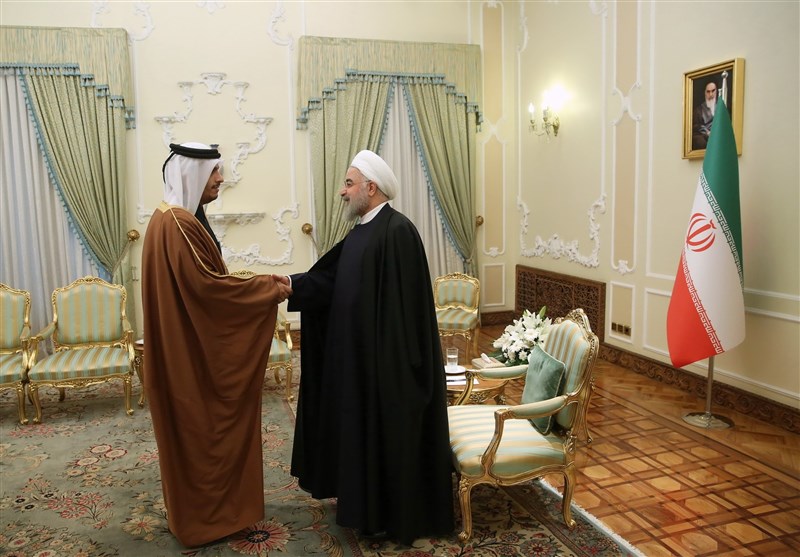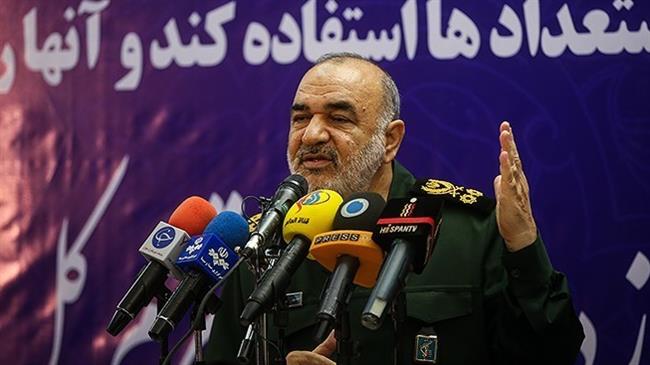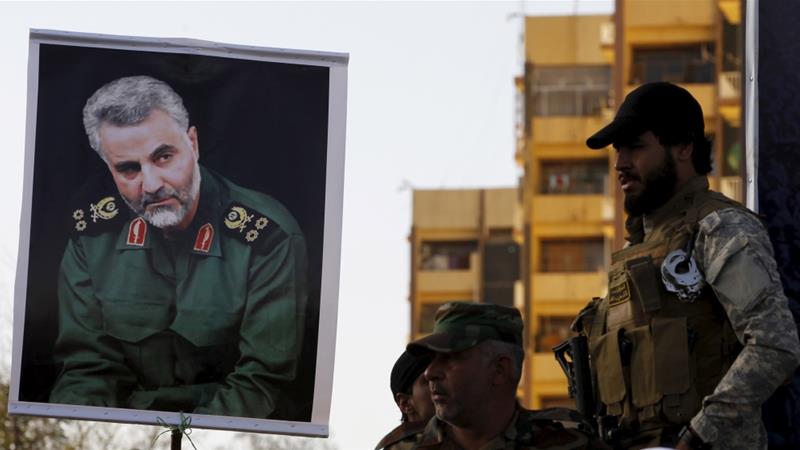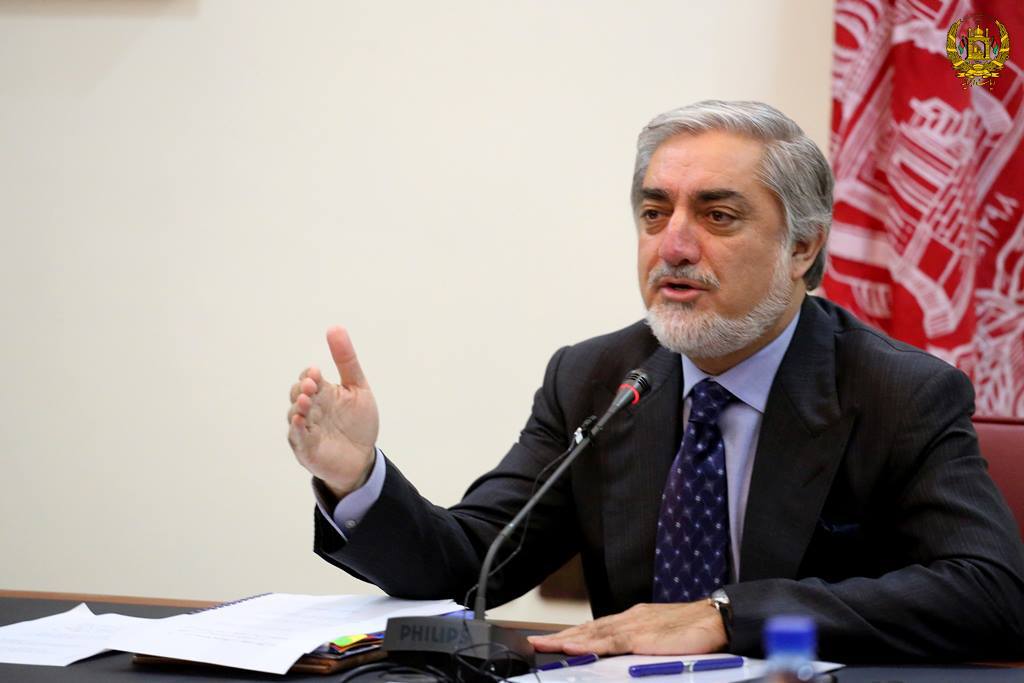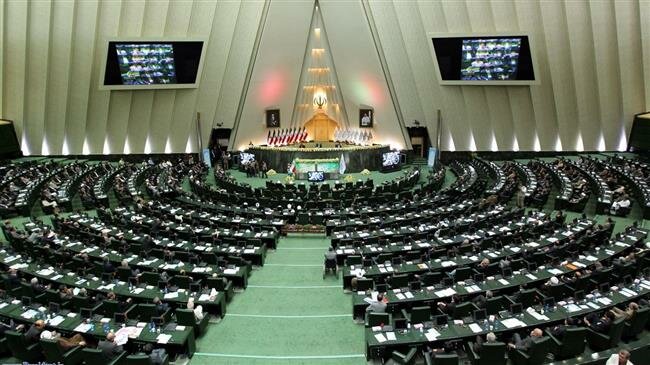Iranian President Hassan Rouhani says the United States is accountable for any consequences of its act of terror against Lieutenant General Qassem Soleimani, the commander of the Quds Force of the Islamic Revolution Guards Corps (IRGC), stressing that Washington will pay a heavy price for its recent terrorist move.
Publish dateSunday 5 January 2020 - 00:02
Story Code : 199675
In a meeting with Qatari Foreign Minister Sheikh Mohammed bin Abdulrahman Al Thani in Tehran on Saturday, Rouhani stressed the importance of holding more consultations between Tehran and Doha given the ongoing situation in the region after the assassination of General Soleimani and Abu Mahdi al-Muhandis, the deputy chief of the Iraqi pro-government Popular Mobilization Units (PMU), at Baghdad airport in the early hours of Friday.
"The Americans have unfortunately taken a new path that can be very precarious for the region. So, closer consultations and coordination among friendly countries are necessary," the Iranian president said.
He emphasized that the Islamic Republic has never initiated any tension that has led to insecurity in the region and blamed “unwise measures” by the US for stoking tensions in the region over the recent years.
He described General Soleimani as an international figure who fought terrorism and played a leading role in promoting security in regional countries, particularly in Iraq and Syria, saying, "At the current juncture, we expect friendly and neighboring countries to explicitly condemn this US crime."
"I hope that we will all denounce state terrorism in unison, and that regional countries will further strengthen their unity, coherence and understanding," the Iranian president stated.
He emphasized that the US terrorist act against General Soleimani was an affront to the Iraqi people and a violation of the Arab country's national sovereignty.
Pointing to the "very destructive" presence of the US in the region, Rouhani added that all regional countries should realize that peace would not be established in the region as long as the Americans are present here.
Both General Soleimani and Muhandis were popular figureheads in helping squelch an ominous rise of Daesh which once came as close as 30 km to Baghdad, while the US withdrew troops from Iraq and looked on.
In all, 10 people -- five Iraqis and five Iranians -- were killed in Friday morning's US strike on their motorcade just outside Baghdad airport as General Soleimani's flight arrived from Syria, leading to speculations that Israeli intelligence played a role.
Iran's Supreme National Security Council (SNSC) said on Saturday that a harsh vengeance "in due time and right place" awaits criminals behind the assassination of the Iranian general.
"Iran's Supreme National Security Council during its extraordinary session today examined various aspects of this incident and made appropriate decisions; and announces that the regime of the United States of America will be responsible for all the consequences of this criminal adventurism," the SNSC said in a statement.
Al Thani, who also serves as Qatari deputy prime minister, said his country is resolved to further improve cooperation with Iran.
He expressed his condolences to the Iranian people over the assassination of General Soleimani and said Doha is also very concerned about such an unprecedented move.
In an earlier meeting with Iranian Foreign Minister Mohammad Javad Zarif, the top Qatari diplomat expressed his concern over the ongoing sensitive and worrying situation in the region in the wake of Genral Soleimani's assassination. Al Thani urged a peaceful solution to ease tensions and restore peace to the region.
Rouhani: US move to assassinate General Soleimani 'big folly’
In a phone call with his Turkish counterpart Recep Tayyip Erdogan, the Iranian president said the US assassination of General Soleimani was a "big folly" and urged all regional countries not to remain silent against such a crime.
Rouhani warned that if countries in the region refrain from standing up to the US act of aggression in a united way, such failure will further embolden the enemy to commit more serious crimes against all regional states.
"The US committed a serious crime against us and if we keep silent, such a measure will be carried out against other countries," he stated.
Erdogan, for his part, offered his condolences to Leader of the Islamic Revolution Ayatollah Seyyed Ali Khamenei and the Iranian government and nation over the IRGC commander's assassination.
He stressed the importance of establishing stability and security in the region and said foreign interference and regional conflicts would hinder the establishment of regional peace.
"The Americans have unfortunately taken a new path that can be very precarious for the region. So, closer consultations and coordination among friendly countries are necessary," the Iranian president said.
He emphasized that the Islamic Republic has never initiated any tension that has led to insecurity in the region and blamed “unwise measures” by the US for stoking tensions in the region over the recent years.
He described General Soleimani as an international figure who fought terrorism and played a leading role in promoting security in regional countries, particularly in Iraq and Syria, saying, "At the current juncture, we expect friendly and neighboring countries to explicitly condemn this US crime."
"I hope that we will all denounce state terrorism in unison, and that regional countries will further strengthen their unity, coherence and understanding," the Iranian president stated.
He emphasized that the US terrorist act against General Soleimani was an affront to the Iraqi people and a violation of the Arab country's national sovereignty.
Pointing to the "very destructive" presence of the US in the region, Rouhani added that all regional countries should realize that peace would not be established in the region as long as the Americans are present here.
Both General Soleimani and Muhandis were popular figureheads in helping squelch an ominous rise of Daesh which once came as close as 30 km to Baghdad, while the US withdrew troops from Iraq and looked on.
In all, 10 people -- five Iraqis and five Iranians -- were killed in Friday morning's US strike on their motorcade just outside Baghdad airport as General Soleimani's flight arrived from Syria, leading to speculations that Israeli intelligence played a role.
Iran's Supreme National Security Council (SNSC) said on Saturday that a harsh vengeance "in due time and right place" awaits criminals behind the assassination of the Iranian general.
"Iran's Supreme National Security Council during its extraordinary session today examined various aspects of this incident and made appropriate decisions; and announces that the regime of the United States of America will be responsible for all the consequences of this criminal adventurism," the SNSC said in a statement.
Al Thani, who also serves as Qatari deputy prime minister, said his country is resolved to further improve cooperation with Iran.
He expressed his condolences to the Iranian people over the assassination of General Soleimani and said Doha is also very concerned about such an unprecedented move.
In an earlier meeting with Iranian Foreign Minister Mohammad Javad Zarif, the top Qatari diplomat expressed his concern over the ongoing sensitive and worrying situation in the region in the wake of Genral Soleimani's assassination. Al Thani urged a peaceful solution to ease tensions and restore peace to the region.
Rouhani: US move to assassinate General Soleimani 'big folly’
In a phone call with his Turkish counterpart Recep Tayyip Erdogan, the Iranian president said the US assassination of General Soleimani was a "big folly" and urged all regional countries not to remain silent against such a crime.
Rouhani warned that if countries in the region refrain from standing up to the US act of aggression in a united way, such failure will further embolden the enemy to commit more serious crimes against all regional states.
"The US committed a serious crime against us and if we keep silent, such a measure will be carried out against other countries," he stated.
Erdogan, for his part, offered his condolences to Leader of the Islamic Revolution Ayatollah Seyyed Ali Khamenei and the Iranian government and nation over the IRGC commander's assassination.
He stressed the importance of establishing stability and security in the region and said foreign interference and regional conflicts would hinder the establishment of regional peace.
avapress.net/vdcguy9qnak9y34.5jra.html
Tags
Top hits
